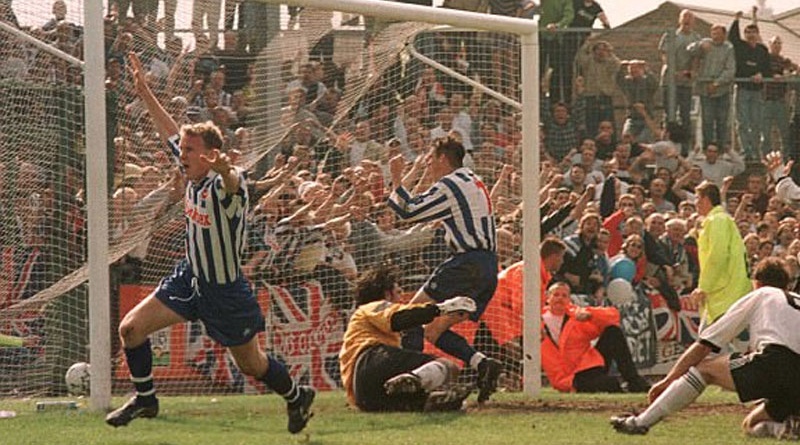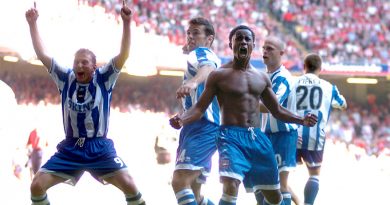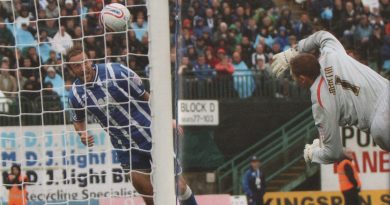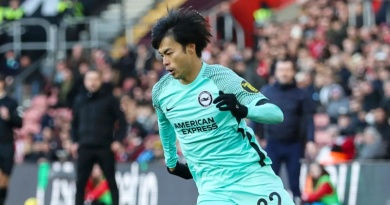What happened to the Brighton team who drew 1-1 at Hereford United?
Saturday May 3rd 1997 was the day of the most important game in Brighton & Hove Albion, bar none. Steve Gritt took his Albion side to Edgar Street to face Hereford United, knowing that defeat would result in relegation out of the Football League and in all probability, extinction.
The Seagulls had been bottom of Division Three for six months. When Gritt took over in December 1996, they were 11 points adrift and in a hopeless position.
A 1-0 win over Doncaster Rovers the previous week in the final game at the Goldstone Ground had lifted the Albion off the foot of the table, allowing them to leapfrog Hereford in the process.
Now they needed a point in the final game of the campaign against the side who had just replaced them at the bottom of the pile to guarantee safety by sending their hosts down.
The prospect of Brighton being a non league club whilst playing home games a 150 mile round trip away in Gillingham didn’t bear thinking about.
It was a tense, nervy, horrible afternoon. An own goal from teenage midfielder Kerry Mayo gave Hereford the lead in the 20th minute and they remained ahead until just past the hour mark.
Craig Maskell rattled the post with a dipping volley and Robbie Reinelt was on hand to sweep home the rebound.
That final 30 minutes seemed to last 300 hours. Brighton survived a couple of late scares to hold on for the 1-1 draw they needed, Hereford being relegated by virtue of the fact that they had scored three less goals across the 46 game season as the sides finished level on points.
Reinelt is rightly remembered as the hero of the hour, the man whose goal kept Brighton in the Football League. But all 13 of the players who were used at Edgar Street played their part in preventing the Albion dropping into the abyss. Here is what happened to them.
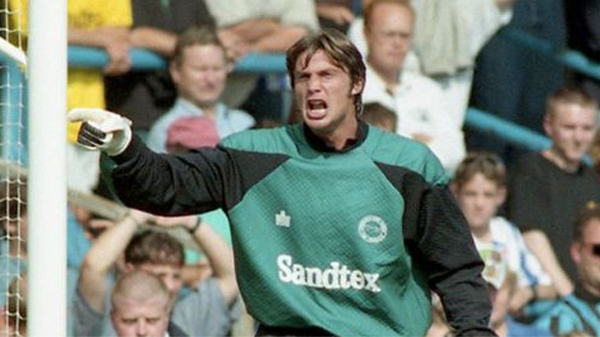
Mark Ormerod
Mark Ormerod was young for a goalkeeper when Brighton picked up that all important 1-1 draw at Hereford. He had only turned 21 three months earlier and the game at Edgar Street was just his 22nd as a professional after wrestling the number one shirt from Nicky Rust following Gritt’s arrival at the Goldstone Ground.
Despite his tender years, Ormerod’s promotion had been a long time coming. He was made number two to Rust in the 1993-94 campaign at just 17, playing second fiddle for three seasons before getting his big break.
Many Albion supporters felt it should have come sooner as Ormerod always acquitted himself superbly in the reserves.
Gritt was the first manager to agree with those sentiments though, and that proved to be a wise decision. Ormerod performed like a seasoned veteran at Hereford.
His one-on-one save from Adrian Foster when the Bulls’ top scorer found himself in on goal in the final minute was every bit as important as Reinelt’s goal. It doesn’t bear thinking about what would have happened had Ormerod not pulled off that stop.
Ormerod remained Brighton’s number one for the next two seasons until a slimmed down Mark Walton overtook a month into the first season at Withdean.
Ormerod was released by Micky Adams in the summer of 2000 and went onto play for Woking, Dorchester Town and Worthing. During his playing career he gained qualifications in finance and is now an area manager for Wesleyan Assurance Society.
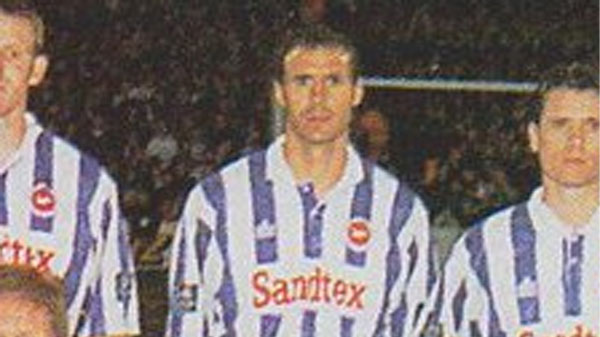
John Humphrey
Gritt’s first move in the transfer market after being appointed Brighton boss was to add a calm head to his back four with the signing of his former Charlton Athletic teammate John Humphrey.
At 36, right back Humphrey was was no spring chicken. But once he had replaced Peter Smith in the side, the Albion lost just three of the 11 games he played – an impact that makes him a seriously underrated piece of the Great Escape jigsaw.
Nobody should have been surprised. Humphrey had been a quality operator when playing alongside Gritt for the Addicks, winning Player of the Season three years running at the Valley between 1987 and 1990.
He had seen it all in a long career, winning three promotions and suffering six relegations with Wolverhampton Wanderers, Charlton, Reading, Gillingham before he arrived at the Goldstone. That experience proved vital to the Albion during the run in as he barely put a foot wrong.
Humphrey was controversially released as part of budget restraints after the 1-1 draw at Hereford, but once Dick Knight’s takeover was fully ratified the new Brighton chairman found some cash to instigate a u-turn and reward Humphrey with a new deal.
The reprieve was short lived however and he was let go in October 1997 as the club struggled financially in exile at Gillingham. Humphrey is now Head of Football at Highgate School, North London and is also said to be a keen magician.
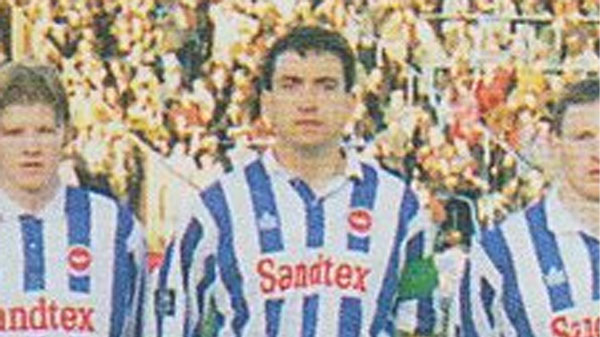
Mark Morris
Mark Morris had been one of Jimmy Case’s final signings as Brighton manager and he made quite the impact, being given the captain’s armband for his debut away at Hartlepool United in which he scored the winner for the Albion’s only away victory of the 1996-97 season.
Morris had been acquired on a free transfer from Bournemouth, for whom he played over 200 times in five years. He began his career as part of Wimbledon’s Crazy Gang as well as representing Aldershot, Watford, Sheffield United and Gillingham.
An injury picked up in the 77th minute of Case’s final game in charge, a 3-2 home defeat against Darlington on Tuesday 3rd December, ruled out Morris out for the next four months.
Gritt was not able to call upon his services until April 1st, but once back to full fitness he played a crucial role in helping deliver 11 points in the final six games at the heart of the Albion defence.
After leaving the Albion in late 1997, Morris went onto manage Dorchester Town. He also ran The Crown and Sceptre pub in Bournemouth and in 2009, confronted a knife-wielding attacker.
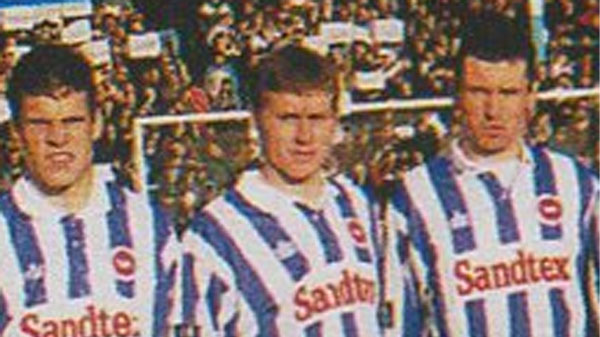
Ross Johnson
For Ross Johnson to be playing in the 1-1 draw between Brighton and Hereford was quite a turnaround for the defender, who had been transfer listed by Case just nine months earlier.
Brighton born and bred, Johnson was offered the chance to sign with Everton as a youngster but turned down Goodison Park in favour of the Albion.
He captained the 1993-94 youth team and made his league debut that same season, going onto become a regular in the 1995-96 campaign when forming a hugely promising centre back partnership with another impressive young defender, Paul McCarthy.
Relegation from Division Two at the end of that season seemed to knock Johnson off his stride and that eventually culminated in Case putting him up for sale.
Gritt’s arrival as manager sparked a remarkable turnaround in Johnson however and he became a mainstay of the Albion defence, always giving 100% to the cause and winning several man-of-the-match awards once he regained his starting spot in late December.
Johnson played through the Gillingham years and made it to Withdean before moving to Colchester United in January 2000 after 146 appearances for the Albion.
He went onto play over 50 times for United with spells at Dagenham & Redbridge, Canvey Island and Worthing following. Johnson is still an Albion fan and regularly watches games with his son.
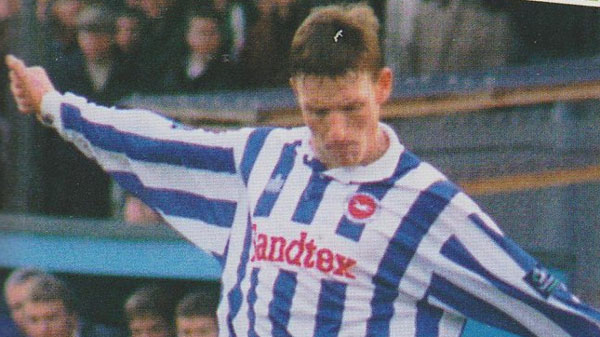
Stuart Tuck
Stuart Tuck was Johnson’s predecessor as Albion youth team captain, skippering the side in the 1992-93 season. He was capable of playing both at centre back or left back, although it was in the latter position that he made his name.
Injuries were not kind to Tuck. When he finally made his first team breakthrough in the 1995-96 season under Liam Brady, he suffered with hernia and pelvic issues which kept him sidelined for many months.
Once fit again, Case made him first choice left back for the 1996-97 campaign following Ian Chapman’s release and he was a virtual ever present from the moment that Gritt was appointed in December.
Tuck was released by Micky Adams in the summer of 1999 after 106 appearances for the Albion. He subsequently became a teacher and has continued to play on the Sussex non league circuit, most recently turning out in the Southern Combination League for Shoreham in the 208-19 season at the sprightly age of 44.
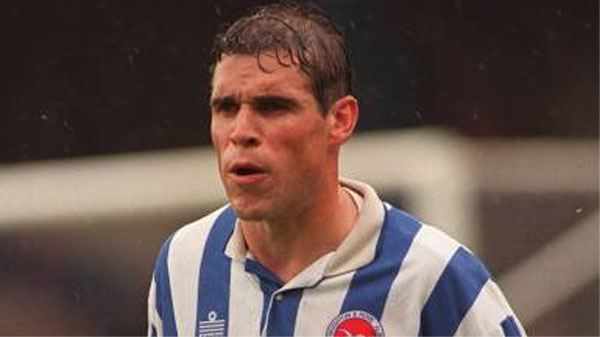
Stuart Storer
Stuart Storer wrote himself into the Brighton history books a week before the 1-1 draw at Hereford when scoring the winner in the final game at the Goldstone against Doncaster Rovers to lift the Albion off the bottom of the Football League.
He had been a regular throughout the 1996-97 campaign under both Case and Gritt and would surely have won Player of the Season had an award been held that year – he did at least pick up the Junior Seagull’s version, which still went ahead.
When he signed in March 1995, Storer became the first player that Brighton had paid a transfer fee for in over three years. Exeter City were the recipients of a modest £15,000, money reinvested following the sale of Kurt Nogan to Burnley.
Storer was a tenacious right winger who once clocked a 100 metre time of 10.4 seconds. He enjoyed success at Birmingham City and Bolton Wanderers before moving to Exeter and great things were expected when he arrived at the Goldstone.
Given the hero status that is quite rightly showered on Storer these days, it seems strange to recall that he was not an instant hit.
He struggled for fitness and form throughout most of his first year at the Goldstone and it was only really in the Great Escape season that he began to shine.
That tells you much about his character. Whilst there was a complete circus going on, Storer knuckled down and gave consistently good performances, even in the first half of the season under Case when relegation looked a certainty.
He remained at the Albion until the summer of 1999 when he was surprisingly released by Micky Adams. Storer had started all five of the games Adams took charge of at the end of the 1998-99 campaign, but clearly the new manager had a 3-5-2 formation in his mind for 1999-00 and an out-and-out winger like Storer would not fit into such a system.
And so after 152 goals and 14 goals – one of them very famous – Storer’s Brighton career was over. He went onto play for several non league clubs, eventually ending his career as a sweeper with Hinckley United. He is now a driving instructor who enjoys holidaying in the beer halls of Munich.
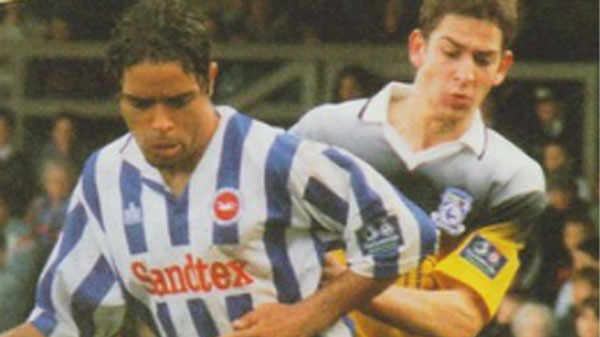
Jeff Minton
Jeff Minton was easily the most technically gifted player in the Brighton side which took to the field for the 1-1 draw at Hereford. In fact on his day, there were not many better central midfielders in the bottom tier.
The only trouble being that Minton only had those days every one in four, his lack of consistency being the reason he played 199 games of his career for struggling Albion sides in the bottom two tiers.
Minton arrived from Tottenham Hotspur in the summer of 1994. He had been capped at youth level by England whilst at White Hart Lane and scored on his Premier League debut for Spurs against Everton in 1992.
A number of clubs wanted him following his release from Tottenham but it was the presence of Liam Brady in the Brighton dugout that convinced him to head for the Goldstone.
Minton was an automatic pick from the moment he arrived and hardly missed a game over the next five seasons before departing to try his luck in the second tier with Port Vale when his Albion contract expired in 1999.
He finished with 31 goals in a Brighton shirt, a decent return for a midfielder in a side who never finished above 16th in any division during the time he spent with the club.
Minton joint-top scored alongside Kerry Mayo in the 1997-98 season and was voted into the PFA Division Three Team of the Year in 1998-99 despite Brighton coming a lowly 17th.
His career at Vale Park lasted just 18 months and he went onto play for Rotherham United and Leyton Orient before dropping into non league.
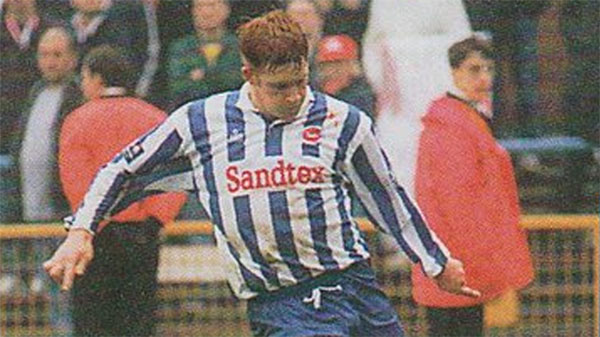
Kerry Mayo
When Brighton went in trailing 1-0 at half time against Hereford, one man had more to lose than most. 19-year-old Kerry Mayo had scored an unfortunate own goal to give the Bulls the lead, turning in Tony Agana’s low cross on the slide as he attempted to clear.
Had it stayed that way, Mayo would have had that goal hanging over his head for the rest of his career.
Luckily, Reinelt rode to the rescue and Mayo subsequently went onto rack up 413 appearances for Brighton, leaving him ninth in the Albion’s all-time appearance list.
He made his debut in the final throes of the Case era in a home defeat to Carlisle United in November 1996.
That was the game when future Brighton favourite Warren Aspinall famously ran from the halfway line with the ball for the Cumbrians, past every single Albion play to score one of the best goals the Goldstone ever saw.
Mayo was a midfielder in those early days and as we’ve already noted, he joint top scored alongside his partner Minton in the 1997-98 campaign.
It was only when Adams arrived in 1999 that Mayo was permanently converted to the left back position where he would go onto enjoy such success, winning promotion in 2001, 2002 and through the Division Two playoff final in 2004.
Mayo was released at the end of the 2008-09 season and played a handful of games on the Sussex County League circuit with Newhaven. He is now a director at the company behind the Proballer app, designed to help volunteers run grassroots football clubs.
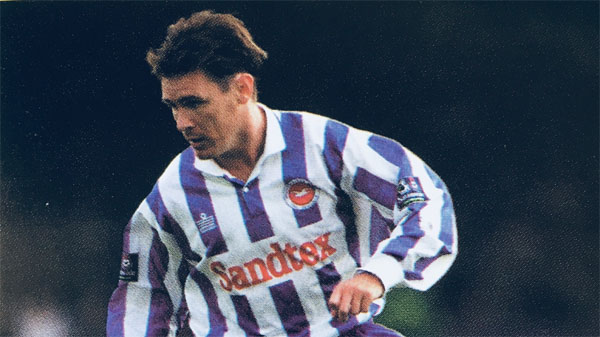
Paul McDonald
Nobody played more games for Brighton in the 1996-97 season than Paul McDonald and as such, the little left winger’s contribution to the cause should not be underestimated. Which shamefully, it often is.
Take the Fans United 5-0 win over Hartlepool United for example. Whilst the event itself quite rightly takes all the headlines, Maskell (himself criminally underrated) is next in line to be associated with the day thanks to his hat-trick.
How many people though remember that McDonald assisted four of the Albion’s five goals against Hartlepool?
Or his ice-cool demeanour as he was made to wait a painfully long time before being able to take Brighton’s equalising penalty in the 4-4 draw with Orient as carnage exploded all around him?
Without those sorts of interventions and his general trickery down the left hand side, Brighton might have needed more than a 1-1 draw against Hereford in the final game of the campaign. We might have even already been relegated.
A few eyebrows had been raised when Case paid £40,000 to Southampton for McDonald’s services in February 1996, but that proved to be money extremely well spent.
McDonald had enjoyed great success during a long association with Hamilton Academical in his native Scotland before heading to the Dell.
He returned north of the border when leaving Brighton as another of the players released due to budget cuts in the autumn of 1997, going onto play for Dunfermline, Partick Thistle and Greenock Morton before ending his career back at Hamilton. McDonald is now academy director at Kilmarnock.
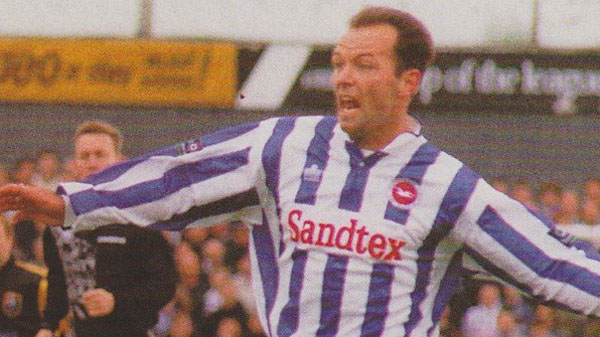
Craig Maskell
Moving nicely on from McDonald, we come to Craig Maskell – another player signed from Southampton in 1996 who does not get the credit he deserves for his role in the Great Escape.
The experienced striker had been top scorer at Huddersfield Town, Reading and Swindon Town before moving to the Dell in 1994.
With the likes of Matt Le Tissier and Neil Shipperley ahead of him on the pecking order, he never really got a fair crack at the top flight with the Saints and so Case paid £40,000 to bring him along the south coast with two months of the 1995-96 season remaining.
Maskell endured a frustrating start to his Albion career, netting just four times in his first 17 games for the club.
He was not particularly quick and he was not particularly strong, which lent to this narrative that he was lazy. As such, the Goldstone faithful never really took to him.
In actual fact, he was a poacher. Maskell looked lazy because he made being in the right place at the right time to gobble up chances look effortless.
Once Gritt took over in December 1996, Maskell went on a scoring spree that saw him end the 1996-97 with 16 goals – an astonishing total for a striker playing in a side who spent over six months bottom of the table.
Without those goals, the Albion would have gone down. He so nearly became the hero of Hereford too. It was his left footed dipping volley which smacked against the foot of Andy de Bont’s post – an inch to the right and Maskell would have scored the equaliser.
Brighton’s exile in Gillingham seemed to impact him more than most the following season and he managed just three goals in 20 appearances before being released when the Albion needed to save money.
He moved to Hong Kong to play for the wonderfully named Happy Valley before returning to England in March 1998, spending a little over a year with Leyton Orient. He retired in the aftermath of the O’s 1999 Division Three playoff final defeat to Scunthorpe United.
Maskell now represents Southampton at masters football – which we suspect he is bloody good at given that he never had much pace when he played – and coaches for Barnet.
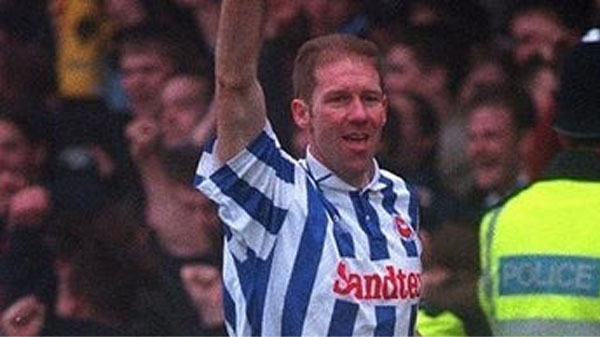
Ian Baird
Had the modern-day ruling whereby suspensions take effect immediately been in place in the 1996-97 season, then Ian Baird would not have played at Hereford.
The Albion captain was famously sent off for fighting Doncaster Rovers’ Darren Moore inside of 20 minutes in the final game at the Goldstone the previous week. But with bans not kicking in until two weeks after the offence, Baird was free to take to the field at Edgar Street.
That red card against Doncaster was in keeping with a striker who made a name for himself as a goalscorer with a fiery temperament.
Baird fetched over £2 million in transfer fees during a career which took in Southampton, The Leeds United, Portsmouth, Middlesbrough, Heart of Midlothian and Bristol City. He also found himself in bother with both the FA and the judiciary on several occasions.
There is one story of him offering out a Brighton fan following the Albion’s 2-1 defeat away at Exeter City on Saturday 14th September 1997.
Baird was only playing in his ninth game for the club following a summer move from Plymouth Argyle, so talk about a way to make a good impression.
By the end of the 1996-97 season, his unwavering commitment and competitive style had endeared him to the Albion support.
His 13 goals also proved vital to the survival effort and as a traditional target man, he thrived on the service provided by Storer and McDonald down the flanks.
Baird retired from professional football when the Albion released him in November 1997, moving to Hong Kong where he managed top flight side Instant-Dict, after which he was appointed Hong Kong’s national team manager in 1999. He is now assistant manager at Havant & Waterlooville.
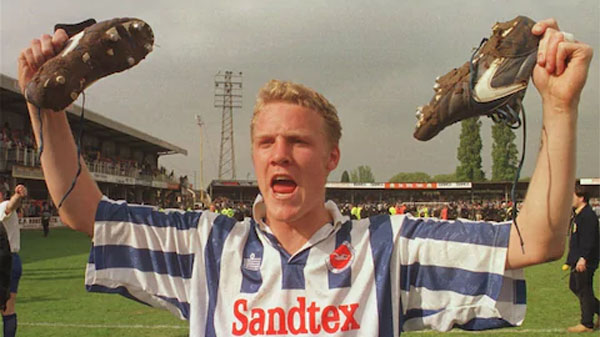
Robbie Reinelt (McDonald 54)
Robbie Reinelt is the man whose name will always be synonymous with Hereford away and the 1-1 draw which kept Brighton in the Football League.
It was only his 12th game for the club after signing from Colchester for £15,000 in February 1997 having been transfer listed by the U’s following a falling out with the management.
That disagreement came shortly after he’d scored against the Albion at Layer Road as Case’s side lost 3-0 against the promotion chasers.
Reinelt’s Brighton debut away at Carlisle United lasted just 24 minutes before a broken nose brought it to a premature end.
He returned from injury, filling in for Baird when the veteran was suspended and impressing to score twice in Albion colours before his famous equaliser at Edgar Street, the goal which kept Brighton alive.
The 23-year-old had been thrown on in place of McDonald as Gritt switched to three up front nine minutes into the second half.
Reinelt had been on the pitch less than 10 minutes when he did what all good strikers do and followed up Maskell’s effort, leaving him in the right place at the right time to strike the loose ball into the empty net despite the best efforts of a Hereford defender to get to it first.
The Albion will forever be in Reinelt’s debt for that moment. Mayo certainly realised the importance, as Reinelt revealed when he spoke to The Argus about his abiding memory from the 1-1 draw between Hereford and Brighton.
“It’s still Kerry running and jumping on my back,” he said. “It’s like it was yesterday. I wouldn’t want him to jump on my back now, he’s put a bit of timber on.”
“He ran so far, jumped on my back and the first thing he said to me was ‘You’ve just saved my life’. He’s a Brighton lad, I can’t imagine what he must have been going through.”
There was some justice in it being Reinelt who was crowned the hero. He’d been an Aldershot Town player when they went out of business and had also endured another last-gasp escape from the Conference when at Gillingham, the Gills just surviving at the expense of Halifax Town in 1993.
Reinelt stayed with the Albion for the 1997-98 season before moving to Leyton Orient. His Brighton career totalled nine goals in 49 games, but he will always be remembered for just one. He now works as part of South Eastern Rail’s track maintenance team.
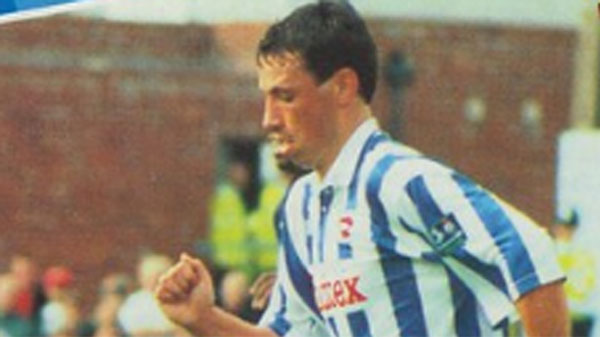
Gary Hobson (Storer 85)
Gary Hobson had been one of the first names on the Brighton team sheet throughout the 1996-97 season, right up until a month before the 1-1 draw at Hereford when he picked up an injury in the 1-0 home win over Barnet on April 1st.
Morris came off the bench to replace Hobson after 58 minutes that evening and the veteran retained his place for the remainder of the campaign alongside Johnson at centre back.
That left Hobson on the bench once he had recovered, with his only action in the final five games coming in the last five minutes at Edgar Street.
Hobson was thrown on in place of Storer as the Albion desperately hung on for the point that would secure Football League survival with a switch to a back five.
A minor role on the day, but still an important one for a man who’d played a big part over the preceding year since arriving from Hull City for £60,000.
He would go onto be a regular for the next two seasons, being named club captain by Brian Horton for the 1998-99 campaign.
Hobson made it to Withdean and along with Ormerod, was the only player to have played in the last season at the Goldstone who started the first game back in Brighton when Mansfield Town were hammered 6-0.
That turned out to be one of Hobson’s last games for the Albion and after 113 appearances in three-and-a-half years, he departed on loan for Chester City in December 1999 before signing for York City permanently in the summer of 2000.
Hobson is now a UEFA match agent, responsible for organising pre-season tours for Premier League, Championship and European clubs.

